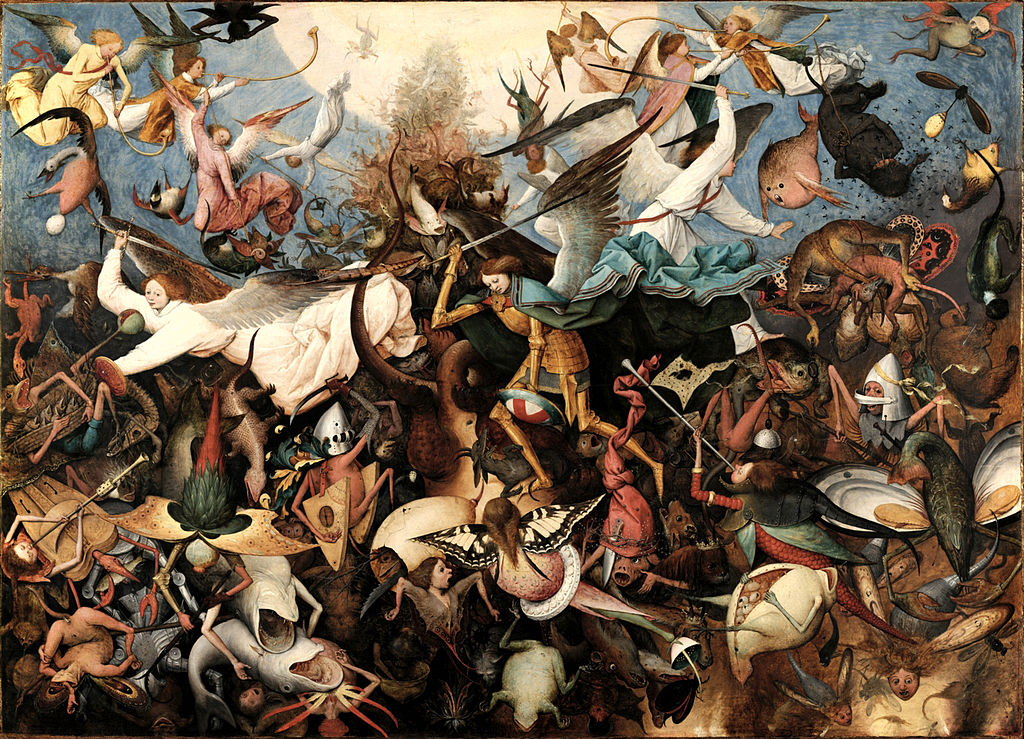Introduction
Pieter Bruegel the Elder is an example of how art can allegorically depict an unstable society and the fundamental essence of people at the same time. His oil-on-panel “The Fall of the Rebel Angels” was painted in 1562 and is now on display in the Royal Museums of Fine Arts in Brussels. The painting depicts the scene of the fall of the angels rebelling against God into hell. A white circle at the top in the middle of the picture represents Heaven, and the sky is blue and light. The angels are noble and well-dressed, while figures in the lower part of the picture are naked, turned into ugly monsters with animal body parts. Hell is denser, chaotic, darker than the upper part of the canvas.
The Painting Description
The painting was created during the Northern Renaissance and depicts a biblical story. The canvas is impressive in how the artist managed to convey the movement; the creatures seem to fall directly on the viewer being at the very bottom of this infernal mess. Just like primitive people who portrayed their world in constant motion for the most accurate display of the world, Bruegel does not depict static figures; they all move. This gives it a unique visual power that captures the viewer and places him in the center of the events. The picture’s theme is the eternal struggle between good and evil, but Pieter Bruegel is known for his allegoric nature and social satire, which could not be reflected in this painting.
The Main Idea and Influence of the Painting
In my opinion, the main idea of the picture lies in Bruegel’s reasoning on people’s essence. Shafak (2010) mentioned that a person is like a compass: one part is on the ground, the other revolves around. Therefore Bruegel was able to create such fascinating pictures. He observed the world, the society around him, analyzed it through a prism of his idea of good and evil. I think the painting tells that all people are inherently good, but they become overgrown with vices over time. However, this does not make them evil; they are between a monster and a human living on the Earth. Bruegel inspired me to treat people with understanding because I am part of this imperfect society; it was compelling.
Lauren Daigle “Look Up Child”
After listening to the song by Lauren Daigle, “Look up child,” and reading about it, I was very moved by the story. It seems to me that it strongly resonates with my impression of the painting. In difficult times, people try to turn to good, to find a source in it. Although we live in an imperfect society, people try to support each other by relying on something bigger above them. I think that this is how the part of the saints that remained in us manifests itself. It ensures our survival and reminds us of the truth. Notwithstanding, I am not a profoundly religious person; this song made me think again about human nature and our existence’s values.
Turtle Vintage Crib Quilt
The Turtle Quilt story made me feel very warm and nostalgic. It seems that the remainder of a family and a piece of home in the form of this blanket reflects, again, the trends of our time. Once, people lived with their relatives throughout their lives, but now we are forced to break away from them, starting on an independent journey. As with the song, I think that family artifacts like this give a sense of support, a feeling that you are not alone in this big world. Thus, a person needs something more significant in the form of faith and the company of supportive and like-minded people.

References
Bruegel, P. (1562). The fall of the rebel angels [painting]. Royal Museum of Fine Arts of Belgium, Brussels, Belgium.
Shafak, E. (2010). The politics of fiction [Video]. TED. Web.